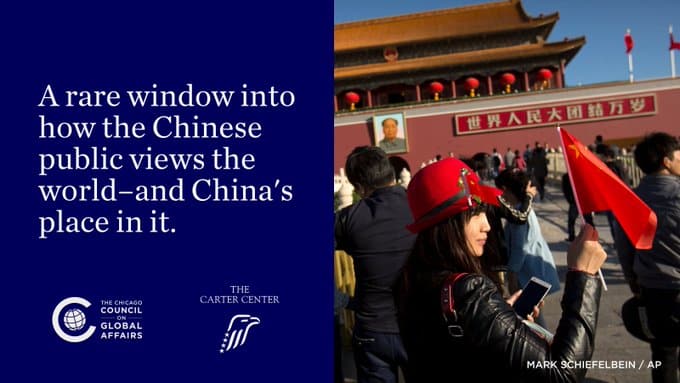Japan’s Prime Minister Takaichi Finally Says Something Close to What Beijing Wants to Hear
Living U.S.-China Relations: Anecdotes From David M. Lampton
- Opinion
 Bikai Chen
Bikai Chen  Yingyi Tan
Yingyi Tan  Miranda Wilson
Miranda Wilson- 02/20/2024
- 0
The U.S.-China Perception Monitor interviewed Dr. David M. Lampton on his new book Living U.S.-China Relations: From Cold War to Cold War, you can find the original transcript here. In the interview, we asked him to share a few anecdotes with us from his life-long dedication to fostering a cooperative U.S.-China relationship. We asked him to share stories that stand out to him as influential moments both in U.S.-China relations and his own life. You may read the three vignettes he shared with us below.
Analysts often hesitate to use anecdotes because they seem so specific to the individual and situation that they may lack wider applicability. On the other hand, anecdotes can convey larger truths and make generalizations tangible.
The first anecdote I would point to happened during my years at the National Committee on US-China Relations (1988 to 1997). During that period, a memorable program we ran involved bringing the mayors of six big Chinese cities, plus a retired mayor of Shanghai, to the United States in mid-1990.
This was the Mayors Delegation headed by Zhu Rongji, who was then Mayor of Shanghai, later becoming Premier of China. Zhu Rongji, as far as the West was concerned, became the poster child for the Reform and Opening-Up Policy in China. Zhu Rongji is widely admired in China, but he was also seen as a tough economic reformer who presided over the serious unemployment generated in the course of reform in the late 1990s. He played a very big role in international affairs as well as domestic policy. I would say, he was the most modern Chinese leader of the communist era in his country.
Let me give you an example: We picked him up one night in mid-July 1990 at the JFK Airport on Long Island. I was the leader of the American welcoming group, so I rode in the limousine from Kennedy Airport back into New York City with him.
We had a police escort, so it was only about a 40-minute ride rather than an hour. In any case, we came up over a hill in Queens, and looked out over the East River. It was all lit up with a number of bridges and buildings – the twin towers, the Chrysler Building, and the Empire State Building jutting skyward. This was the first time he ever saw that iconic view. I wondered what he would say. I just let him take in the sight. After a pause the first question he asked me was, in paraphrase: “Tell me about the Port Authority of New York and New Jersey. What is it? Why was it created?” I responded that because New York was surrounded by other administrative jurisdictions with each autonomous area affecting the others (New York City, New York State, the State of New Jersey, plus multitudes of other subordinate jurisdictions), there was need for an over-arching planning and infrastructure implementation body to raise revenues and foster economic development through connectivity. He said, “Oh, you’re capitalists, but you see the need for planning. We’re communist, believe in planning, but we need a lot more market. I think we are all striving for the right balance of market and plan. We are all mixed economies.”
In my view, that is the kind of vision and comparative thinking that the U.S.-China relationship needs. We don’t need to conceive of ourselves at opposite ends of the spectrum all the time. Along many dimensions we could conceive of our relationship as facing the same problems and coming up with comprehensible solutions. I think that’s a much more productive way to look at our relationship than being worlds apart on every issue.
Another incident occurred earlier in my career, in 1982. I lived in Wuhan, Hubei, at Wuhan University, the base from which I conducted archival, interviewing, and field research on “Management and Planning of the Yangtze River Valley.” There were many large-scale water conservancy, power, and flood control projects underway in the province, notable among which were the Danjiangkou Dam on the Han River and the Gezhouba reregulating dam on the main channel of the Yangtze River—the mammoth Three Gorges Dam was on the drawing boards.
I was doing my field research all over Hubei Province. There were not many foreigners there, so I had to live and operate in Chinese. My Chinese is not as good as I would like, but it worked. The issue I was researching involved how China tries to manage and plan the Yangtze River Valley, which covers parts of nine provinces in China. Similar to the Port Authority of New York and New Jersey or the Tennessee Valley Authority in the United States.
My hosts took me up near Hubei’s border with Henan, to the Danjiangkou Reservoir. There is nothing like being on the ground if you want to understand a geophysical reality and the problems to which it gives rise. This is why it’s important to go see things and talk to people, because some things you’d never think of on your own or glean from documents and statistics. Anyway, I looked out on the reservoir and saw peasants, their small huts, and sheep grazing in the distance; it looked as though they were walking on the surface of the water. The reservoir authorities had raised the water level to within inches of flooding the ground on which the peasants were living and their sheep grazing. The reservoir’s engineers and management were explaining to me that they hadn’t been able to raise the water level to the dam’s designed height because the peasants wouldn’t move. In fact, one engineer said to me something to the effect of: “Sometimes they accept our money to move, but they take the money, go away for a period, and then come back. We’ve paid some peasants three times to move.”
I thought to myself, “What kind of authoritarian government can’t move peasants standing in the way of an enormous investment that will benefit all the surrounding big cities, drive factories, provide flood control, improve navigation, and provide irrigation water? What kind of authoritarian government do they have here that can’t move a few peasants?”
This led me to wonder why the Communist Party cadres that supposedly control everything can’t move peasants, or at least find it very challenging to do so. Well, there are lots of interest groups in China, and the Chinese cadres don’t always have an answer for the logistics. If they move the peasants, where do they put them? If they put them in another village, who’s now going to be the leader in this new expanded village? Is there enough land, and what do they do when various pieces of land are of varying qualities? Displacement creates a lot of practical problems. One of my informants at Danjiangkou said Hubei and Henan provinces had to bargain over which province would take how many refugees and who had to compensate who?
I’ve come to the conclusion that none of us should wish to be a Chinese leader. There are a lot of problems that never get solved, they just have to be managed. This isn’t to whitewash all of the injustices of moving peasants off their land, but the U.S. and every country that has built modern infrastructure has had to move people. Often, people don’t want to be moved. It led me to realize China faces many of the same issues as any other country—we just don’t always see it.
I’ll share one more anecdote.
Luck. Life swings on the hinges of luck. Above, I mentioned going to Hubei in 1982 for field research. I was a political scientist, and China was still coming out of the Cultural Revolution decade. A political scientist like myself, wandering around in one of China’s interior provinces, interviewing people about building dams and irrigation systems, was potentially sensitive. Indeed, the U.S. National Academy of Sciences and its Committee on Scholarly Communication with the People’s Republic of China that sponsored my research was uncertain whether they could get me and my field research project approved. If unapproved, nobody was going to speak with me or even house me. In my case, two ministries had to approve the project: the Ministry of Education and the Ministry of Water Conservancy. It’s hard enough to get one ministry in China to approve of anything that’s perceived risky. To get two ministries to approve is more than twice as hard. Unexpectedly, the Chinese authorities did approve, and that approval was accomplished promptly.
Sometime later I ran into a Vice Minister of Education, Huang Xinbai. Unknown to me, he had been in charge of approving people like me and my project. He told me he knew about the case of my project and its approval process. He recounted that my project also needed approval by the Minister of Water Conservancy. He went on to explain that he was married to the Minister of Water Conservancy. “We solved the problem at home.” And I said, “You mean this was pillow talk?”
Of course, many other factors also account for the positive outcome, not least that my state of residence (at that time) was Ohio and our governor was building a successful relationship with Hubei, and everyone wanted this project to go well.
So, this experience taught me that when all is said and done, careers and opportunities happen for many reasons—but it’s a lot of luck.







